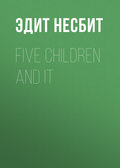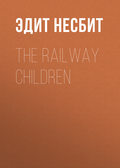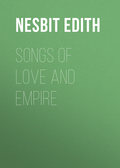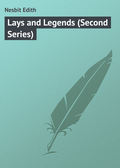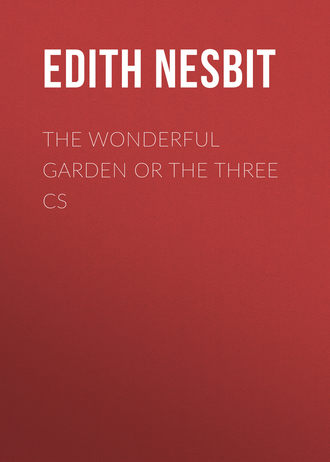
Эдит Несбит
The Wonderful Garden or The Three Cs
So a row of tumblers, containing such greasy things as never before had profaned their limpid depths, stood in a row like beakers on the bench of a secret laboratory.
‘It’s all very well,’ said Charlotte, replacing the last book and ringing the bell, ‘but how shall we get them to him?’
‘William will manage it at tea-time,’ Caroline was sure.
‘But we’ve got to bring the clergyman home to tea.’
‘Oh, bother!’ was the remark that sprang to the lips of Caroline. ‘I never thought of that.’
CHAPTER X
BREWING THE SPELL
It was awkward, certainly. And the awkwardness kept worrying and worrying at the back of Caroline’s mind all through the pleasure of going out in the carriage to make a call by themselves, and the delight of the call, which was diversified by peppermints, a fine collection of butterflies, and being allowed to try and play the harmonium.
It was while Charles and Charlotte were busy with this in the large bare room which had been the last rector’s drawing-room, and was now used for all sorts of parish parties, that Mr. Penfold took Caroline into the conservatory to show her a pet newt.
‘A friend of mine with an orange waistcoat,’ Mr. Penfold said.
He was a very nice newt, but even his orange-coloured stomach could not drive away the worries from the back of Caroline’s mind. How were the tumblers of food to be got to Rupert? Altogether she felt worried; the whole adventure was beginning to feel too big and too serious. And when Mr. Penfold, suddenly asking her if she could keep a secret, showed her a green parrot sitting on a nest behind a big geranium, she longed to say that she would keep his, and to tell him her own.
What she did say when she had admired the parrot was:
‘You’re a clergyman, and so I suppose you know all about right and wrong?’
‘I do my best to know,’ he said. ‘Well?’
‘Well, aren’t there some secrets you ought to keep, even if you know that some people would say you oughtn’t to if they were to know you were keeping them – only of course they don’t?’
I think it was rather clever of Mr. Penfold to understand this; but he did.
‘There are some things we all have to judge for ourselves,’ he said. ‘Could you give me an instance of the sort of thing you mean? Not the real thing you were thinking about, of course; but something like it.’
‘Of course not the real thing,’ she said, and paused.
The temptation to be very clever came to her. She would tell him the real thing, and he would never think it could be the real one.
‘Well, suppose,’ she said slowly, and stopped.
‘Suppose?’
‘You heard about that boy who ran away, and they were looking for him yesterday?’
‘He wasn’t found, was he?’ the clergyman asked, carefully picking dead leaves from a salmon-coloured fuchsia.
‘No,’ said Caroline. ‘Well, suppose the boy had come to you, what would you have done? You wouldn’t have given him up, would you?’
‘I don’t know any of the facts of the case,’ he answered slowly.
‘But suppose it was a runaway slave.’
‘Certainly not.’
‘Well, then,’ said Caroline.
‘But, you see, it wouldn’t stop with not giving him up. He would have to be fed and clothed, and have somewhere to sleep, and it would be impossible, quite impossible, to keep him concealed. They would be sure to find him.’
‘Ye-es,’ said Caroline; ‘but what could you do?’
‘Well, leaving the boy out of the question – he was just given as an instance, wasn’t he – suppose you were in any other sort of difficulty, the thing for you to do would be to tell your uncle. You take it from me, you can trust him absolutely. He’ll decide what’s right. Unless you’d like to tell me. I’d help all I could.’
‘If ever I have a secret I can tell you, I will,’ Caroline promised. ‘We’re a Secret Society just at present. That’s why we’re all wearing red roses.’
‘I wish I could have joined it,’ said the Unusual Clergyman; ‘perhaps you’ll let me join later?’
‘If I ever can, I will,’ said Caroline cordially. And then the others came to look at the newt, and they all went home in the carriage to tea. The Uncle and the Unusual Clergyman talked about things which the children did not understand, or perhaps they might have understood if they had listened, but their thoughts were in tumblers full of beef and pudding behind the books on the shelves, and though they caught a few words, ‘golden bough,’ ‘myths,’ ‘folk-lore,’ they did not pay much attention till they heard the words ‘secret rites’ and ‘symbolic,’ and then the Uncle suddenly said:
‘Well, come along to my room, won’t you? I’ll show you that passage I was speaking of.’ And he and the clergyman went off.
Of course the three C.’s hastened to the stable-yard. The men had gone to their tea and the servants were having theirs, so it was quite safe. The tumblers of food, now thinly iced with congealed fat and looking very uninviting, were carried in the side-pockets of Charles and under the pinafores of the girls.
William received the visitors with marked disapproval.
‘You’re late,’ he said. ‘I’ve got to go down to the village to see about a new axle for the light cart. What’s all that rubbish? Ain’t what I gives him good enough for his lordship?’ He looked sourly at the tumblers the children had stood upon the corn-bin.
‘Of course it is,’ said Caroline, feeling that a fatal error had been committed. ‘We only thought he’d like a change. Don’t be cross, William. You know you’re our beanyfactor.’
‘Well, beany or no beany, you don’t see ’im to-night. Off with you. I’ll see ’e’s all right. Yes, you can leave the grub. You come ’bout eight in the morning if you can, and then we’ll see.’
It was a disappointed party that returned to the dining-room.
‘I did think it would be different,’ said Charlotte. ‘It’s all so dull. And it’ll go on being like this for weeks.’
‘It’s the dreadful anxiousness I don’t like,’ said Caroline. ‘The clergyman said secrets were awkward pets to keep, and they are.’
‘Why is everything always different from what it was when you thought it was always going to be the same?’ Charlotte asked, with the air of an inquiring philosopher.
‘You see,’ said Caroline, ‘we are rather young for rescues.’
‘Yes, but,’ Charles urged, ‘we couldn’t do anything except rescue. We can’t do anything else now, however young we are.’
They talked about it for an hour, and said the same things over and over, and then Mr. Penfold came in to say good-bye.
‘I’m translating that book. I’m getting on with it,’ he said; ‘it’s most interesting. I’ve got some of the manuscript in my pocket.’
‘Oh do let us look!’ they all said at once.
‘Well, just one page then, only one, or I shall be late for the choir practice.’
He laid down a type-written page and they all sprawled over the table to read it.
‘To obtain your suit,’ it said. ‘Herbs favourable to the granting of petitions…’ There was a blank for the names of the herbs, which Mr. Penfold hadn’t yet had time, he told them, to translate.
‘Suitors to kings and those in high places shall note well these herbs,’ the translation went on, ‘and offer the flowers and leaves in bunches or garlands when they go to tender their suit. More efficacious it is, however, if the herbs be bruised and their juices expressed, and a decoction given to drink in a little warm sack or strong waters or any liquor convenient. But for this ye need interest with the household of the king or him who has the granting of the desire. These herbs have the virtue to incline the heart favourably towards suitors if gathered in the first quarter of Luna by the hand of the petitioner in his proper person.’
That was the end of the page. The children had to own that they couldn’t understand it.
‘Oh,’ said the Unusual One, ‘it only means if you’re going to ask a favour of any one. One of the herbs was balsam, I believe. Now I must fly. Keep the page till to-morrow if you like.’
They did like. And when he was gone Charlotte spoke.
‘Look here. We shall have to tell the Uncle. Let’s decoct him some balsam and then tell him.’
But the others wouldn’t hear of it. They had to hear of it, however, next day, when at twelve o’clock William allowed them to visit Rupert in his loft. Rupert’s eyes were very bright and his hands were very hot, and he coughed almost all the time – a very little cough, but most persevering.
‘William,’ Caroline came down the ladder to say, ‘we must tell uncle. I’m sure Rupert’s ill. He ought to have a doctor.’
‘You’re right, Miss,’ William replied, ‘What did I tell you from the first?’
Caroline expected stern opposition from Rupert, and even feared that he might say that rather than have his secret given to an uncle he would indeed run away to sea. But he only turned his head restlessly on the straw and said, ‘Oh, I don’t care! Do what you like.’
The day was, most fortunately, fine. So after dinner they all went into the garden to get the balsam. But they couldn’t find any balsam.
‘I’ll get the Language Of,’ said Caroline, ‘and we’ll take the herbs that seem most likely to make a person do what you want.’
In finding suitable ‘herbs,’ first in the book and then in the garden, the time went quickly: there was a good deal of talk, of course.
‘I really don’t think we need worry,’ said Caroline again and again. ‘I think with the herbs it’s sure to be all right, and the Uncle will let us keep him.’ She spoke as if Rupert were a stray kitten or an ownerless puppy. ‘You see the fern-seed came right, and the sorry bouquet we gave to the Wilmington came right, and you’ll see this will. We’ll give him some in his tea as well as the bouquet, and that’ll make quite certain.’
‘It’s all nonsense,’ said Charlotte. ‘Besides, he’ll spit it out. I know I should. You can lead an uncle to the teapot but you can’t make him drink.’
‘We’ll have calceolaria,’ Caroline finally decided, ‘because it means “I offer you pecuniary aid,” or “I offer you my fortune”; and, of course, Rupert’ll cost something to keep. And double china aster, if we can find it, because it means “I share your sentiments.” Straw means agreement, so we’ll have that too. It needn’t show in the bouquet. And eschscholtzia, because that signifies “do not refuse me.”’
They got the calceolarias and the eschscholtzias, but the gardener said the asters weren’t out yet.
‘It’s only two flowers,’ said Charlotte; ‘suppose we wear something in our button-holes to mean “we trust in you”?’
Nothing meaning just that, however, could be found in the book. The nearest was heliotrope, ‘I turn to thee,’ and rhododendron, ‘danger.’ A bouquet of rhododendron and heliotrope was, however, found to be incompatible with the human button-hole, so these flowers were added to the Uncle’s bouquet.
‘And now,’ said Charlotte, ‘let’s go in and express the juices. We can’t chew them this time, because it would be disgusting.’
‘Scissors and tea, I think,’ Charles said, and this bright suggestion was acted on.
The Unusual Clergyman was perhaps partly to blame for what followed. Calceolaria, rhododendron, and eschscholtzia (a word I spell with the greatest pain and difficulty) were cut up very fine indeed with Caroline’s nail-scissors, and secreted in Charles’s handkerchief – a clean one fetched down for the purpose. When the tea-tray was brought in, and the maid had gone to ring the bell which summons uncles, the lid of the teapot was hurriedly raised and a good handful of chopped leaves and petals thrust in.
The magic bouquet was placed on the Uncle’s plate.
He came in, pale and shadowy as ever, and yet looking, the children thought, somewhat different, and took up the bouquet. It was rather an odd one. The eschscholtzias were drooping miserably among the strong rhododendrons; so was the heliotrope. And the calceolarias seemed shrivelled and unhappy; and the straw, of which in his enthusiasm Charles had brought a large double handful, showed much more than Caroline had meant it to.
‘What’s all this, eh?’ the Uncle asked.
‘It’s a sym-what’s-its-name bouquet.’
‘Simple?’ asked the Uncle; ‘it’s anything but that. Sympathetic?’
‘No,’ said Charlotte, ‘sym-what Mr. Penfold was saying to you yesterday about magic.’
‘Symbolic. I see. And what does it symbolise?’ he asked kindly, but without smiling.
‘We’ll tell you when you’ve had your tea,’ they all agreed in saying.
The Uncle sniffed the bouquet, and that was perhaps why he did not sniff the tea. They wondered how he could possibly not smell it, for as Caroline poured it out it seemed to fill the room with its strange mixed scent. However, he just stirred it and talked about the weather, not at all amusingly, and presently he lifted the cup to his lips.
Six anxious eyes followed his every movement; and his movements from the moment the tea entered his mouth were brisk and unusual. He screwed up his nose in a way that at any less important moment would have been funny, went quickly to the window, leaned out, and did exactly what Charlotte had said he would do.
‘Excuse me,’ he said, coming back to the table and taking up the cup; ‘I beg your pardon for that natural if impolite action. I think this tea must be poisoned. Don’t drink any of it, and please ring the bell. I must inquire into this.’
Nobody moved.
‘We aren’t going to drink any,’ said Charles.
‘Oh, don’t inquire!’ said Charlotte anxiously.
‘Was it very horrid?’ asked Caroline. ‘I am so sorry.’
‘Will you kindly ring?’ the Uncle asked coldly. It was a terrible moment, but Caroline met it bravely.
‘No,’ she said; ‘don’t ask the servants, please, uncle; it’s not their fault. We put the stuff in the teapot.’
‘You put poison in the teapot? For me?’ The Uncle suddenly sat down.
‘No, no, dear uncle,’ cried Caroline; ‘not poison. Only calceolaria and eschscholtzia and straw and rhododendron; it isn’t poison. It’s just a little magic spell to make you say “Yes” to what we want.’
‘Have I given you reason to suppose that I could not grant your requirements without spells?’ he asked severely.
‘Oh no! But we wanted to make sure.’
Charlotte held out the translation and the Uncle read it.
‘But this doesn’t say calceolaria and all the rest of it,’ he objected.
‘No, it doesn’t say. That’s just it. So we had to get the nearest things we could. Straw for agreement, because we want you to agree to what we want; and calceolaria, because it means “I offer you pecuniary aid”; and rhododendron to show it’s dangerous not to; and es-what’s-its-name for “do not refuse me.”’
‘Do not refuse you what?’ said the Uncle in an exasperated voice.
The three of them looked at each other and two of them said, ‘You tell, Caro.’
Caroline clasped her hands very tight, and drew a long breath, and said very fast indeed:
‘There was a boy ran away from school called Rupert his master was cruel to him and he came here and we hid him and put the Police off the scent and he’s such a nice boy and his father’s in India like ours and he’s in the straw-loft now with such a dreadful cold and I know the doctor ought to be sent for and if you give him back to that Murdstone man I know he’ll die and I can’t bear it and I’m very very sorry it was silly putting the stuff in your tea but we weren’t taking any chances and if you’re angry about the tea do punish us but stick to Rupert and oh uncle I don’t know what to say but what would you have done if you’d been us?’
‘There, there,’ said the Uncle gently, and not seeming as surprised as they expected; ‘don’t cry. Don’t you begin,’ he added with more sternness to Charles, who was becoming subject to sniffs. ‘There, go and wash your faces. We’ll have some fresh tea made in another pot, and talk it over.’
‘It’s hopeful, I tell you,’ said Caroline, washing her face; ‘he’s not said “No.” Oh, I believe the spell’s working. Stop snivelling, Charlotte. There’s nothing to cry about, yet.’
‘You began,’ said Charlotte truthfully.
‘I didn’t,’ said Caroline; ‘and if I did, you put it all on to me, and I didn’t know what I was saying or doing. Come on down. We mustn’t let him think it over by himself too long.’
Over tea, for which nobody felt very hungry, the Uncle asked many questions, and heard the full story of the escape and the Royal Order of the Secret Rose.
‘And don’t blame William, will you?’ Charlotte begged; ‘because he’s done nothing but say tell you ever since it began.’
‘I shall not blame William,’ said the Uncle.
‘I wanted to tell you,’ said Caroline; ‘at least next day I did, but it wasn’t my secret. And Rupert agreed for us to tell now.’
Tea was over and there was a silence. Uncle Charles was looking from one to another of the children.
‘And you really believed,’ he said slowly, ‘that putting that abominable stuff in my tea would make me agree to keep your runaway boy?’
‘There was the fern-seed, you know,’ said Charlotte; ‘and it said in the book that the decoction of balsam would make you grant our desire, and calceolaria’s as good as balsam any day.’
‘And you really thought it would?’
‘Won’t it?’ asked Caroline, and her eyes filled with tears. ‘Oh, uncle, if you only knew how I hated giving you that horrid stuff instead of your nice tea. It hurt me far more than it did you.’
The Uncle laughed faintly, but he did laugh.
‘Then you will grant our desire,’ cried Charlotte. ‘You couldn’t laugh if you weren’t going to. So you see the herbs did do the magic.’
‘Something seems to have done it,’ said the Uncle. ‘You had better give me a red rose and two buds and enrol me as a member of your Royal Order of the Secret Rose.’ He found himself suddenly involved in a violent threefold embrace.
‘I will give you a word of advice,’ he said, settling his neck-tie when it was over. ‘Never try to administer philtres or potions inwardly. Outward application is quite as efficacious. Indeed I am not sure but what your bouquet was in itself enough to work the spell. Something has certainly worked it. For I may now tell you that Mrs. Wilmington had her suspicions, and by a stratagem surprised the secret this afternoon. She told me and wished to send for the Police. But I heard William’s story, and decided not to send for the Police till after tea. But now Mrs. Wilmington has seen the boy, you may as well make her a Royal Rose too. She will not betray you.’
The children looked at each other amazed.
Mrs. Wilmington? It was unbelievable.
‘The doctor is coming at once,’ said the Uncle. ‘I hope it isn’t measles.’
‘Then, if we hadn’t spelled you, should you have given him up to the Police?’ Caroline asked.
‘Your telling me, or the spell, or something has stopped that. Now run away and play in the park. If the illness is not infectious you shall see your little friend later.’
‘Oh, uncle,’ said Charlotte in heartfelt tones, ‘it’s a long lane that never rejoices. We have been so sick about it. And now it’s all right. And you are a dear.’
‘The dearest dear,’ corrected Caroline.
‘I call him a brick,’ said Charles, with the air of a man of the world.
‘There’s only one thing more,’ said the Uncle; ‘go and get me that red rose, and then I shall know that you’ll let me into the next really important secret you have.’
They ran to get it, and the Uncle took it and the petition bouquet away with him to his study.
When the doctor had paid his visit they were allowed to see Rupert for a few minutes before bedtime – not in the straw-loft as they had expected, but in the blue room, which is hung with tapestry, and has blue silk curtains to windows and four-poster.
‘They brought me in at tea-time,’ Rupert told them. ‘That Mrs. Wilmington of yours is first-class. I don’t know what you meant by saying she was a rotter. And your uncle – isn’t he a brick?’
Charles was glad he had thought of that word himself, Rupert’s using it showed it was the correct thing to say.
‘I’m jolly glad you told him,’ Rupert went on. ‘Of course we couldn’t have gone on the other way. And he’s sent a telegram a mile long to my people in India to ask whether I mayn’t stay on here till school begins again.’
‘How splendid,’ said Charlotte, awe-struck; ‘how awfully splendid! I didn’t think uncles could be like that.’
‘Uncles are all right,’ said Rupert, ‘if you treat them properly.’
Then he began to cough, and Mrs. Wilmington came in with lemonade and honey, and told the others that they were tiring him, and it was bedtime anyhow.
‘If you treat them properly,’ said Charlotte dreamily, as she brushed her hair, ‘uncles are all right. Do you think he would have been all right if we hadn’t treated him just as we did?’
‘No,’ said Caroline. ‘Just unhook me, will you, Char? I don’t. I think it was the spell.’
‘So do I,’ said Charlotte. ‘Stand still or I can’t unhook you. What the eye doesn’t see, the hook doesn’t come out of. I expect the tea was like what Miss Peckitt’s sister’s mistress had when their house was burglared – nervous shock. I expect that is the same as electric shocks making people walk that couldn’t before. I expect the nervous shock made that part of uncle that grants favours wake up and walk, don’t you?’
‘You make haste into bed,’ said Caroline. ‘What’s the good of talking all round it? We did what it said in the book, and it happened like it said in the book it would happen. I believe you could manage everything with spells if you only knew the proper ones. When I grow up I shall be a professoress of magic spells and have my business office in a beautiful palace, and kings and queens will come in their golden chariots to ask me what spells they ought to do to make their subjects happy and not poor, and for everybody to have a chicken in the pot, and – ’
‘Talk about talking!’ said Charlotte. ‘Come along to bed; do.’



